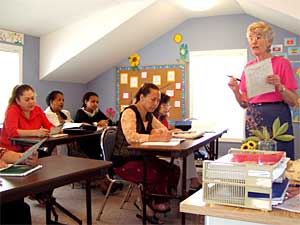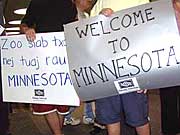| The Hmong in Minnesota |
Hmong may join waiting list for English classes
June 27, 2004
 |
| Students from all over the world learn English at the Multicultural School for Empowerment in St. Paul. Sister Anna Louise Kemen teaches the class. (MPR Photo/Tom Scheck) |
St. Paul, Minn. — Walk into the Multicultural School for Empowerment in St. Paul and you'll see a wide variety of Minnesota's immigrant population.
Immigrants from Somalia, Eritrea, Mexico, Laos and other countries learn English and other life skills. The school is run by the School Sisters of Notre Dame.
"The day shift," teacher Sister Anna Louise Kemen says. "What time is the day shift?"
Many of the students come to the class with little or no knowledge of the English language. Others can speak the language but want to continue to improve their skills.
 | |||
Kemen's class is going through the basics right now. They practice the weather forecast and learn how to use a work schedule. Kemen tries to teach the class the differences among the day shift, the swing shift and the late night, "graveyard shift."
"It's a very hard shift. Graveyard. Does anyone know graveyard?" Kemen says. "Graveyard is where we bury the people who die."
Some of these students work the very shifts that Kemen is talking about. Others aren't working but hope to get a job once they improve their English. Elsa from Eritrea says she didn't speak any English when she arrived in Minnesota but she's hopeful that she'll can become fluent.
|
I'm improving my English a little. I hope I improve my English so I can find a job and have a wonderful future.
- Elsa from Eritrea |
"I'm improving my English a little," Elsa said. "I can speak a little bit. I hope I improve my English so I can find a job and have a wonderful future."
Future immigrants may have more difficulty entering classes like this one.
State officials say 300 people are currently on a waiting list to enroll in English language learning classes. Barry Shaffer is the state director of Adult Basic Education, says adult education took a 6.5% cut in state funding in the last state budget. At the same time, Shaffer says enrollment is increasing at nine percent a year.
"What we''ve seen is all chairs are filled," Shaffer said. "All classrooms are filled and there's no capacity to add additional teachers because of the shortage of the money."
The shortage of space and money in adult literacy programs worries Tom Cytron-Hysom, who is the facilitator of the St. Paul Community Literacy Consortium. He says St. Paul's adult literacy and English as a Second Langauge programs can barely meet current demand, let alone help the thousands of Hmong refugees who are expected to resettle in St. Paul by the end of the year.
 | |||
"If people don't have adequate english language education early on," Cytron-Hysom said. "It will take much longer for them to acculturate, much longer to feel comfortable into society and inadvertently may feed into anti-refugee prejudice that's already here."
Cytron-Hysom says he hopes to meet demand by running a public service campaign to recruit volunteers to adult language programs. He also says it's critical that local educators communicate the need for additional money to state and federal lawmakers.
Sen. Mee Moua, DFL-St. Paul, says she understands there's stress to the education system. Moua, who is one of two Hmong lawmakers at the state capitol, says she hopes to convince Gov. Pawlenty and her fellow lawmakers to help with services for the Hmong resettlement.
"We have a system that is already stressed," Moua said. "Whether these refugees are coming here or not, you and I would be having a discussion about not having enough services for people who are language disadvantaged."
The federal government has provided $3.3 million to date to help Minnesota, Wisconsin and California with the Hmong resettlement efforts. Adult eductors say they don't know if that money will be used for adult education classes.
|
News Headlines
|
Related Subjects
|

